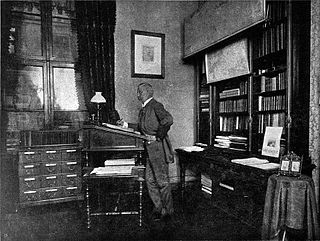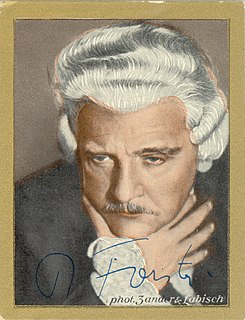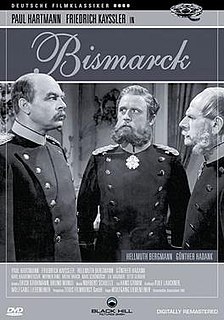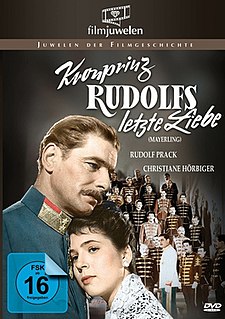
Karl Lueger was an Austrian politician, mayor of Vienna, and leader and founder of the Austrian Christian Social Party. He is credited with the transformation of the city of Vienna into a modern city. The populist and antisemitic politics of his Christian Social Party are sometimes viewed as a model for Adolf Hitler's Nazism.

The Vienna Central Cemetery is one of the largest cemeteries in the world by number of interred, and is the most well-known cemetery among Vienna's nearly 50 cemeteries. The cemetery's name is descriptive of its significance as Vienna's biggest cemetery, not of its geographic location, as it is not in the city center of the Austrian capital, but on the outskirts, in the outer city district of Simmering.

Wieden is the 4th municipal district of Vienna, Austria. It is near the centre of Vienna and was established as a district in 1850, but its borders were changed later. Wieden is a small region near the city centre. After World War II, Wieden was part of the Soviet sector of Vienna for 10 years.

The Hagenbund or Künstlerbund Hagen was a group of Austrian artists that formed in 1899. The group's name derived from the name Herr Hagen, the proprietor of an inn in Vienna which they frequented.

Heinrich Ritter von Wittek was an Austrian politician of the Christian Social Party (CS). He served as head of the k.k. Railway Ministry and as Minister-President of Cisleithania for four weeks in 1899/1900.

Lil Dagover was a German actress whose film career spanned between 1913 and 1979. She was one of the most popular and recognized film actresses in the Weimar Republic.

Rudolf Forster was an Austrian film actor. He appeared in more than 100 films between 1914 and 1968. His autobiography Das Spiel, mein Leben was published by Propyläen Verlag in 1967. He was born in Gröbming, Austria, and died in Bad Aussee, Austria, five days before his 84th birthday.

Lady Windermere's Fan is a 1935 German comedy film directed by Heinz Hilpert and starring Lil Dagover, Walter Rilla and Aribert Wäscher. It is based on the play Lady Windermere's Fan by Oscar Wilde. The film's sets were designed by the art director Heinrich Beisenherz and Ludwig Reiber.

Bismarck is a 1940 German historical film directed by Wolfgang Liebeneiner and starring Paul Hartmann, Friedrich Kayßler, and Lil Dagover.

Heinrich August Franz Schroth was a German stage and film actor.
Karl May is a 1974 West German biographical drama film directed by Hans-Jürgen Syberberg, starring Helmut Käutner as the writer Karl May. It is considered the second part in Syberberg's "German trilogy", preceded by Ludwig: Requiem for a Virgin King from 1972 and succeeded by Hitler: A Film from Germany from 1977.

The Higher Command is a 1935 German historical film directed by Gerhard Lamprecht and starring Lil Dagover, Karl Ludwig Diehl and Heli Finkenzeller. During the Napoleonic Wars, a Prussian army officer assists a British diplomat to construct an alliance to defeat Napoleon's France.
Marianne Beskiba was a portrait painter who was the long-time mistress of Karl Lueger, the mayor of Vienna from 1897 to 1910. Her book about him, published after his death, created a sensation and is an important source of information on his political tactics.

Crown Prince Rudolph's Last Love is a 1955 Austrian historical drama film directed by Rudolf Jugert and starring Rudolf Prack, Christiane Hörbiger and Winnie Markus. The film portrays the tragic 1889 Mayerling Incident, in which Rudolf, Crown Prince of Austria and his lover Baroness Mary Vetsera committed suicide.

Chronicles of the Gray House is a 1925 German silent historical drama film directed by Arthur von Gerlach and starring Paul Hartmann, Rudolf Forster and Lil Dagover.

Orient Express is a 1927 German silent thriller film directed by Wilhelm Thiele and starring Lil Dagover, Heinrich George and Angelo Ferrari.

The Kwannon of Okadera is a 1920 German silent film directed by Carl Froelich and starring Lil Dagover and Werner Krauss.

Königliche Hoheit is a 1953 West German comedy film directed by Harald Braun and starring Dieter Borsche, Ruth Leuwerik, and Lil Dagover. It is based on the 1909 novel of the same name by Thomas Mann.
This page is based on this
Wikipedia article Text is available under the
CC BY-SA 4.0 license; additional terms may apply.
Images, videos and audio are available under their respective licenses.















